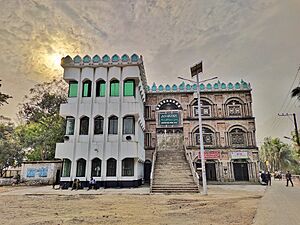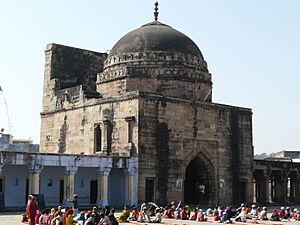Karamat Ali Jaunpuri facts for kids
Quick facts for kids Karamat Ali Jaunpuri |
|
|---|---|
| Religion | Islam |
| Denomination | Sunni |
| Personal | |
| Born | Muhammad Ali Jaunpuri June 12, 1800 CE (18 Muharram 1215 AH) Jaunpur, North India |
| Died | May 30, 1873 (aged 72) (3 Rabi' al-Thani 1290 AH) Rangpur, Bengal Presidency (modern-day Bangladesh) |
| Resting place | Karamatia Mazar, Munshipara, Rangpur |
| Children | Hafiz Ahmad Jaunpuri Abdul Awwal Jaunpuri |
| Relatives | Abdur Rab Jaunpuri (grandson) Abdul Batin Jaunpuri (grandson) Rashid Ahmed Jaunpuri (grandson) |
| Senior posting | |
| Predecessor | Syed Ahmad Shaheed |
| Successor | Hafiz Ahmad Jaunpuri |
| Religious career | |
| Disciple(s) | Mohammad Abu Bakr Siddique Hafiz Ahmad Jaunpuri Azimuddin Hanafi |
| Influenced | Muhammad Ishaq Abdul Latif Chowdhury Fultali |
Karamat Ali Jaunpuri (born Muhammad Ali Jaunpuri) was an important Muslim leader in the 1800s. He was born on June 12, 1800, and passed away on May 30, 1873. He was a social reformer and started a movement called the Taiyuni movement.
Karamat Ali Jaunpuri helped spread Islamic teachings in Bengal and Assam through his speeches. He also wrote more than forty books. One of his well-known students was Syed Ameer Ali.
Contents
Early Life and Family Background
Muhammad Ali Jaunpuri was born in Jaunpur, North India. This was on June 12, 1800. His family was known for their religious background.
His father, Abu Ibrahim Shaykh Muhammad Imam Bakhsh, was a student of a famous scholar named Shah Abdul Aziz. Karamat Ali's younger brother, Shah Rab Ali Jaunpuri, was also a religious figure.
People started calling him "Karamat" because they noticed his special qualities. He sometimes referred to himself as "Ali Jaunpuri" or "Ali Jaunpuri, better known as Karamat Ali."
Education and Learning Journey
Karamat Ali Jaunpuri started learning Arabic and Persian from his father. Later, he studied Hadith (sayings of Prophet Muhammad) and other Islamic studies with different teachers.
He learned how to read the Qur'an perfectly and mastered different ways of reciting it. He also became very skilled in Nastaliq and Tughra calligraphy, which is a beautiful way of writing. People said he could write a whole chapter of the Qur'an on a single grain of rice!
Besides his religious studies, he also learned martial arts and wrestling. At 18, he became interested in tasawwuf, which is about spiritual growth. He joined Syed Ahmad Shaheed's movement and quickly became a leader, guiding others.
Making a Difference in Jaunpur
Karamat Ali Jaunpuri worked to improve religious practices in many cities in northern India. In Jaunpur, he noticed that the call to prayer (adhan) was not done properly during the day. He worked hard to make sure the adhan was heard five times a day in mosques.
He also helped fix problems at the historic Jama Mosque, Jaunpur. This mosque was being used for non-religious gatherings and even for tying cattle. Karamat Ali Jaunpuri helped bring back the five daily prayers to the mosque. He also started regular Friday sermons there, which continued for many years.
Because of his strong efforts, some people tried to harm him. But he was able to escape due to his skills in martial arts. He also started two religious schools in Jaunpur to spread knowledge: Madrasa Hanafia and Madrasat-ul-Quran.
Traveling to Bengal and Assam
In 1822, Karamat Ali Jaunpuri was asked to travel to Bengal and Assam to teach Muslims there. He played a big role in spreading Arabic, Urdu, and Islamic knowledge in these areas.
He traveled to many places, including Dhaka, Mymensingh, Chittagong, and Rangpur. Since he traveled mostly by water, he set up a special "traveling madrasa" inside a large boat. His students lived on the boat, and he paid for their expenses while teaching them.
Political Ideas
Karamat Ali Jaunpuri's movement, the Taiyunis, had different ideas about how to deal with the British rulers. They believed it was better to work with the British government rather than fight against them.
This was different from another movement, the Faraizi movement, which thought British India was a "land of war" (Dar al-Harb). The Faraizis stopped holding Friday prayers and Eid prayers because of this. But Karamat Ali Jaunpuri said that British India was a "land of safety" (Dar al-Aman) because people were allowed to practice their religion freely.
His view was supported by other Muslim scholars and helped people like Nawab Abdul Latif and Syed Ahmad Khan work with the British Empire. Karamat Ali Jaunpuri even had debates with the Faraizis about these ideas.
Personal Life
Karamat Ali Jaunpuri was married four times. His first wife in Jaunpur passed away. He also married two women in Noakhali, who also died during his lifetime. His fourth wife, from North India, lived with him in Rangpur.
His Written Works
Karamat Ali Jaunpuri wrote about 46 books. Nineteen of these books were put together into a three-volume collection called "Zakhira-e-Karamat." Many of his other works are harder to find today.
Here are some of his books:
- Miftahul Jannat
- Zeenat al-Musalli
- Zeenat al-Qari
- Kawkab-e-Durri
- Tarjama-e-Mishkat Sharif
- Aqaid-e-Haqqa
- Tazkiratul Aqaid
- Qawl ath-Thabit
- Maqami al-Mubtadieen
- Haqq al-Yaqin
- Bay'at-o-Tauba
- Qawl al-Amin
- Murad al-Murideen
- Qawl al-Haq
- Merat al-Haq
- Imtinan al-Qulub
- Mokashifat-e-Rahmat
- Mulakkhas
- Barahin Qat'iyyah fi Mawlud Khayr al-Bariyyah
- Farz-e-Aam
- Hujjat-e-Kateya
- Nur al-Husa
- Zad at-Taqwa
- Kitab-e-Esteqamat
- Nurun Ala Nur
- Rahat-e-Ruh
- Quwwat al-Iman
- Ihqaqul Haqq
- Rafiq as-Salikeen
- Tanweer al-Qulub
- Tazkiyat an-Neswan
- Nasim al-Haramain
- Maulood-e-Khairul Bariyyah
- Keramatul Haramain
- Qurratul Wiyyun
- Resala-e-Faisala
- Okazatul Mumineen
- Fath-e-Bab-e-Sabiyan
- Dawat-e-Majnun
Death and Lasting Impact

Karamat Ali Jaunpuri became ill during his travels in Rangpur in 1873 and passed away on May 30, 1873. He was buried near the Munshipara Jame Mosque in Rangpur.
He had 14 children. Two of his sons, Hafiz Ahmad Jaunpuri and Abdul Awwal Jaunpuri, also became well-known religious figures in Bengal.
His Students and Followers
Karamat Ali Jaunpuri had many students and followers who continued his work. Some of them include:
- Hafiz Ahmad Jaunpuri (1834–1899)
- Mohammad Abu Bakr Siddique (1865–1943)
- Qari Muhammad Jawed Bakht
- Nadiruzzaman Bhuiyan
- Khwaja Tamizuddin (died 1899)
- Munshi Azimuddin Hanafi (1838–1922)
- Qazi Muhammad Sami
- Ashraf Ali Majumdar (1817–1883)
- Moulvi Qudratullah
- Zulqad Ali (1796–1891)
- Maulvi Sarfaraz Ali
- Sayyid Muhammad Shah (died 1920)
Places Named After Him
Several schools and mosques are named after Karamat Ali Jaunpuri, showing his lasting influence:
- Noakhali Karamatia Kamil Madrasa (1850)
- Keramatia Mosque and Mazar (1860s)
- Char Fasson Karamatia Kamil Madrasa (1945)
- Buzurg Santoshpur Karamatia Fazil Madrasa (1948)
- Pabitrajhar Karamatia Fazil Madrasa (1950)
- Sayedpur Karamatia Fazil Madrasa (1952)
- Bara Rangpur Karamatia Kamil Madrasa (1959)
Images for kids
 | Kyle Baker |
 | Joseph Yoakum |
 | Laura Wheeler Waring |
 | Henry Ossawa Tanner |





